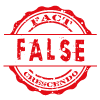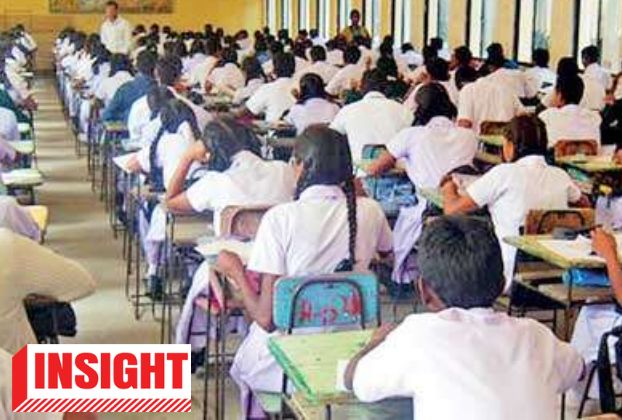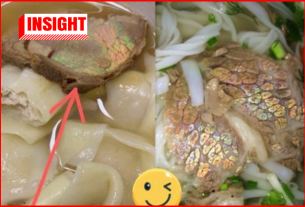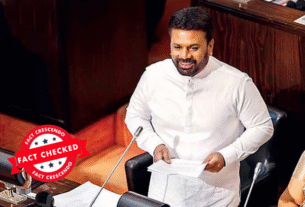Subscribe to our WhatsApp Channel
The composition and the quality of the school curriculum in Sri Lanka is a topic that is discussed very often. Very often it is questioned how useful are the subjects that a student learns from childhood when getting a job and about the extent to which these subject streams contribute to the creation of a knwoledgeable and morally upright human being.
The new educational reforms that are to be implemented under the National People’s Power Government, which have been under discussion for some time, are also being debated these days.
It is due to the social media discussion regarding whether the subject of ‘History’ has been removed from the school curriculum. We conducted a fact check to see the credibility of this.
Social Media Posts :
Social media posts were circulated suggesting that the subject of History has been removed from the school curriculum.
Here how those posts were widely shared through social media.
Here’s how we did a fact check to see whether the subject of ‘History’ has been actually removed from the school syllabus.
Fact Check :
The first program to inform Members of Parliament about the new education reforms to be implemented from 2026 was held in Parliament on July 11 under the patronage of Prime Minister Harini Amarasuriya.
The press release issued by the Prime Minister’s Office informed the members of Parliament about the goals and objectives new reforms, the guiding priniciples, the main and the most important parts or core components of education according to the new reforms, curriculum reform, the arrangements for implementing the reforms, and teacher training.
However, we checked whether the subject History has been removed from the compulsory subjects through the curriculum reform as mentioned in the social media posts.
Stages of education and the major changes made therein
Under the School Syallabus Revision, the education phases and the major changes made therein are as follows.
- Senior Secondary Phase 2 Education
Grade 12-13:
Modular and Credit based curriculum
4 Academic streams and 1 Skill stream
- Senior Secondary Phase 1 Education
Grade 10-11
Modular and Credit based curriculum
Introduction of both academic and merit based pathways for elective and additional study subjects
National level assessment for 7 subjects
- Junior secondary education
Grade 6-9:
Modular and Credit based curriculum
Introduction to Basic studies and Additional studies
Introduction to Grade 9 Competency Assessment
- Primary Education
Grade 1-5 :
Basic activities Integrates Syllabus
- Early childhood education
Early childhood education policy has been drafted
History is a compulsory subject in the curriculum for grades 6-9
According to the new educational reforms, History is a compulsory subject in the currciculum for grades 6-9 under junir secondary education. Therefore, it is clear that the above social media posts are not regarding this category.
Source for the circulated social media posts
What was shared on social media was the fact that History is not included among the five compulsory subjects according to thE core curriculum for Grades 10 and 11. Since history is included as an elective subject, only students who choose History have the opportunity to study that subject, blocking the opportunity for other students to study that subject.
The reported curriculum is as follows.
To examine this, we focused our attention on the curriculum for grade 10 and 11 and its structure
Grade 10-11 syllabus in 3 categories
According to the report, the syllabus for grade 10 and 11 is divided into 3 categories.
- The Common Core Curriculum for students studying in grades 10-11 has 5 compulsory subjects and 2 elective subjects. It is worth 18 credits. This is what was shared on social media.
2.Also, for Further Learning, 4 subjects under the stream (3 main streams) that students are expected to choose for Advanced Level 4 subjects in the merit sector are included in this. This is worth 14 credits.
3.Transversal Skills – Credit 3.
These are essential skills that are not limited to a specific subject or job, but are useful across different areas of life, learning and work. However, this module will only be initiated when there are sufficient people and facilities to support them properly.
14 subjects for the Grade 10-11 syllabus
According to the above categories, the syllabus for Grades 10-11 includes 14 subjects. Accordingly, the 14 subjects consist of the following.
5 Compulsory Subjects in the first category of the Common Core Curriculum
- Mother tongue, English Language, Mathematics, Science, Religion and Value Education.
Elective subjects which students can choose 3
- Second National Language
- Information Communication Technology
- History
- Civic Education
- Health and Physical Education
- Technology
- Agriculture management Technology
- Design and Engineering Technology
- Food and Consumer Technology
- Artistic Product Technology
- Aquatic Product Technology
- Aquatic Bio-resources Technology
- Geography
- Aesthetics Education (Oriental Music, Western Music, Carnatic Music, Dancing, Bharatha Natyam, Arts Drama and Theatre)
- Entrepreneurship and Financial Literacy
Accordingly, a student will have to study a total of 7 subjects, including the 5 compulsory subjects and 2 elective subjects in the first group.
Further Learning
Here, for the purpose of further studies, 4 subjects from a main section, 2 compulsory subjects and 1 skill subject should be selected, which is 7 in total.
Students should choose 4 subjects from one of the following sections.
- STEM
Applied Mathematics, Pure Mathematics, Biology, Chemistry, Physics, Health and Physical education, Computer Science, Data Science, Agricultural Science, Engineering Technology, Bioengineering Technology, Food and Consumer Technology. Aviation Studies.
- Humanities and Social Scineces
Language and Literature, Media and Communication, Foreign Languages, Classical Languages, Civic Education, History, Geography, Social Science, Philosophy/ Logic, Oriental Music, Western Music, Caranatic Music, Dancing, Bharatha Natyam, Arts, Drama and Theatre, Film Studies
- Management and Entrepreneurship
Economics, Mathematics, Information and Communication Technology, Accounting, Business Studies, Business Statistics, Entrepreneurship and Financial Literacy, Supply Chain Management
- Skills Path
Construction and Infrastructure, Creative Industries, Primary Industries, Social and Community Service, Manufcturing and Technology
Transversal Modules
Appreciation of Literature, Media Studies, Industrial Exposure, Service Sector Studies, Global Studies, Social Services, Health and Sports, Applied Technology, Aesthetic Appreciation, Film Studies, Foundation for Career Readiness, Digital Citizenship
It is cumpulsory to study History and Aesthetics under thr 2nd category
A review of the report reveals that although History is not included among the 5 compulsory subjects in the Grade 10-11 Common Core Curriculum, the subjects of History and Aesthetics are made compulsory under Grade 2 of the syllabus. You can view the full report submitted by the Ministry of Education regarding educational reforms here.
Under the first category (Common Core Curriculum), there are 7 subjects in total, including 5 compulsory subects and 2 elective subjects, and 7 subjects in the second category (Further Learning), which are to be studies for the purpose of Advanced Level for further studies.
Which means,
- STEM section: Four subjects chosen from this section + History+ Aesthetics (from the Humanities and Social Sciences section) + One subject chosen from the Skills section
or
- Humanities and Social Sciences section: 4 subjects selected from this section+ 2 subjects from the STEM section+ 1 subject from the Skills section
or
- Management and Entrepreneurship section: 4 subjects chosen from this section+ History+ Aesthetics (Liberal Arts stream)+ 1 subject from Skill section
or
- Skills Section: 4 subjects from this section+ History+ Aesthetics (Liberal Arts stream)+ 1subject from any other stream
The above section was explained in the reports provided by the Ministry of Education
Addressing the false information circulating that history has been removed from the school curriculum, the Minister of Education, Higher Education and Vocational Education and Prime Minister Dr. Harini Amarasuriya stated as follows.
<iframe src=”https://www.facebook.com/plugins/video.php?height=476&href=https%3A%2F%2Fweb.facebook.com%2Fnewslk%2Fvideos%2F1791314944757618%2F&show_text=true&width=476&t=0″ width=”476″ height=”591″ style=”border:none;overflow:hidden” scrolling=”no” frameborder=”0″ allowfullscreen=”true” allow=”autoplay; clipboard-write; encrypted-media; picture-in-picture; web-share” allowFullScreen=”true”></iframe>
Explanation from the Ministry of Education
We contacted a secretary at the Ministry of Education to confirm further information on this.
Students sit for the exam only in 7 subjects
We inquired whether students should sit for the exam in all 14 subjects, and she stated that the students should sit only for the 7 subjects from the Common Core Curriculum section
The other 7 subjects will be added to the assessment marks for the term test
However, it was stated that although grade 10-11 school students have to study 7 subjects, including the 4 subjects of their chosen section as well as the compulsory subjects, depending on the subject they choose for the Advanced Level in the second group (Further Learning), term examinations are not held for these 7 subjects in the second group. However, these subjects are taught as modules, and the marks obtained by students are reported through a GPA system, so that students cannot ignore them.
She stated that these reports are currently being submitted to provincial education authorities, and that a clear report on this will be released in the future in a way that is easy to explain to the public.
However, as History is not included in the compulsory subject stream, only the students who choose History are allowed to sit for the examination.
The first GCE (O/L) examination under the new education reforms will be held in 2029.
Implementation of curriculum reforms for Grades 1 and 6 from 2026
Each classroom period will be 50 minutes, and the total school period will be extended by 30 minutes.
A skills test will be introduced for grade 9 students starting in 2029.
This assessment evaluates:
- Literacy b) Numeracy c) Propensity to pursue further studies in a specific field.
Students will be given the opportunity to choose subjects from academic or vocational streams.
Under the new education reforms, the first G.C.E. (O/L) examination will be held in 2029, and the G.C.E. (A/L) examination will be held accordingly.
අධ්යාපන අමාත්යාංශයේ සම්පූර්ණ වාර්තාව
අපගේ කරුණු විමර්ශන පිළිබඳ තොරතුරු දැන ගැනීමට එක්වන්න
Facebook | Twitter | Instagram | Google News | TikTok | Youtube

Title:New Education Reforms: Exams Only for 7 Out of 14 Subjects in Grades 10–11
Fact Check By: Fact Crescendo TeamResult: False






